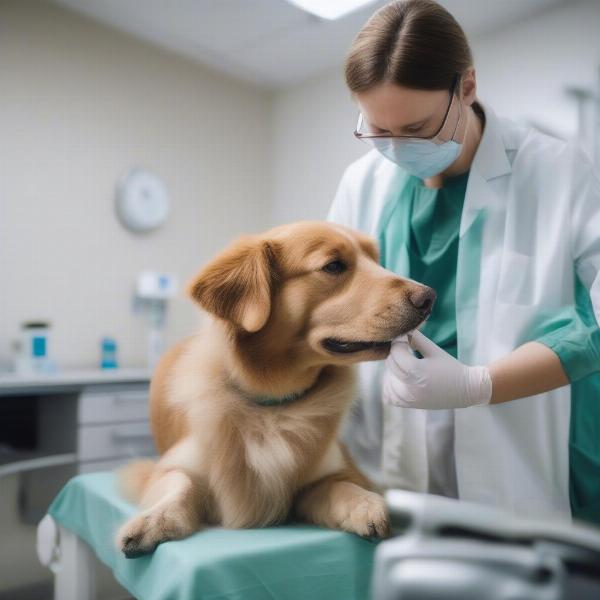Bee pollen is often touted as a superfood for humans, packed with vitamins, minerals, and antioxidants. But what about our canine companions? Can dogs eat bee pollen, and is it actually beneficial for them? This is a common question among dog owners, and we’ll explore the potential benefits and risks of giving bee pollen to your furry friend.
Understanding the Buzz Around Bee Pollen for Dogs
Bee pollen is a collection of flower pollen packed by worker honeybees into granules. It’s a rich source of protein, vitamins (including B-complex and C), minerals, amino acids, and antioxidants. Proponents of bee pollen for dogs claim it can boost immunity, improve digestion, reduce allergies, and even enhance athletic performance. However, scientific evidence supporting these claims in dogs is limited. While studies on humans suggest potential benefits, it’s crucial to remember that dogs metabolize substances differently.
Potential Benefits of Bee Pollen for Dogs
While more research is needed, anecdotal evidence and some preliminary studies suggest bee pollen may offer certain benefits for dogs:
- Immune System Support: The antioxidants in bee pollen may help strengthen the immune system, potentially protecting against infections and diseases.
- Allergy Relief: Some believe bee pollen can desensitize the immune system to allergens, reducing allergy symptoms in dogs. However, this needs more scientific backing. It is important to consult with your vet before using bee pollen for allergies as it may worsen the condition in some cases.
- Improved Digestion: Bee pollen’s enzyme content may promote healthy digestion and nutrient absorption.
- Wound Healing: Bee pollen is thought to have antibacterial and anti-inflammatory properties, which may contribute to faster wound healing.
- Increased Energy Levels: The nutrient-rich nature of bee pollen may lead to improved energy levels and stamina.
Risks and Considerations When Giving Dogs Bee Pollen
While bee pollen may have potential benefits, it’s crucial to be aware of the potential risks:
- Allergic Reactions: Just as with any new food, dogs can be allergic to bee pollen. Start with a tiny amount and observe your dog for any signs of allergy, such as itching, swelling, hives, or difficulty breathing. If you suspect an allergic reaction, stop giving bee pollen immediately and contact your vet.
- Contamination: Bee pollen can be contaminated with pesticides or other harmful substances. Choose high-quality bee pollen from a reputable source.
- Interactions with Medications: Bee pollen may interact with certain medications. Consult your vet before giving bee pollen to your dog if they are on any medication.
 Vet Examining Dog for Allergies
Vet Examining Dog for Allergies
How to Introduce Bee Pollen to Your Dog’s Diet
If you decide to give your dog bee pollen, do so gradually. Start with a very small amount mixed with their regular food. Monitor your dog for any adverse reactions. If they tolerate it well, you can gradually increase the amount. The recommended dosage varies depending on the dog’s size and weight. Consult your vet for guidance on the appropriate dosage for your dog.
Can Puppies and Senior Dogs Eat Bee Pollen?
Puppies and senior dogs can potentially benefit from bee pollen, but it’s crucial to exercise caution. Always consult your vet before giving bee pollen to puppies, senior dogs, or dogs with any underlying health conditions.
Conclusion: Bee Pollen for Dogs – Proceed with Caution
Bee pollen may offer some health benefits for dogs, but more research is needed to confirm its efficacy. While anecdotal evidence suggests potential advantages, it’s crucial to be aware of the risks and proceed with caution. Always consult your vet before adding any new supplements to your dog’s diet, especially if your dog has existing health conditions or is on medication.
FAQs:
- What are the signs of a bee pollen allergy in dogs? Itching, swelling, hives, difficulty breathing, vomiting, or diarrhea.
- How much bee pollen should I give my dog? Consult your veterinarian for the appropriate dosage based on your dog’s size, age, and health condition.
- Where can I buy high-quality bee pollen for my dog? Look for bee pollen from reputable sources that specialize in pet supplements or human-grade bee pollen that is free from contaminants.
- Is bee pollen a replacement for regular dog food? No, bee pollen should be considered a supplement, not a replacement for a balanced dog food diet.
- Can I give my dog local bee pollen? Consult your vet first. Locally sourced bee pollen may contain higher levels of pesticides or allergens.
- What if my dog doesn’t like the taste of bee pollen? Try mixing it with a small amount of wet food or a treat your dog enjoys.
- Can pregnant or nursing dogs have bee pollen? It’s best to avoid giving bee pollen to pregnant or nursing dogs unless specifically recommended by your veterinarian.
ILM Dog is a leading international pet website dedicated to providing dog owners with reliable, practical information on all aspects of dog care. From breed selection and puppy care to senior dog health and training, we cover everything you need to know to ensure your furry friend lives a long, happy, and healthy life. Whether you’re a seasoned dog owner or just starting your journey, ILM Dog is your go-to resource for expert advice and valuable insights. Contact us today at [email protected] or +44 20-3965-8624 for personalized guidance and support.